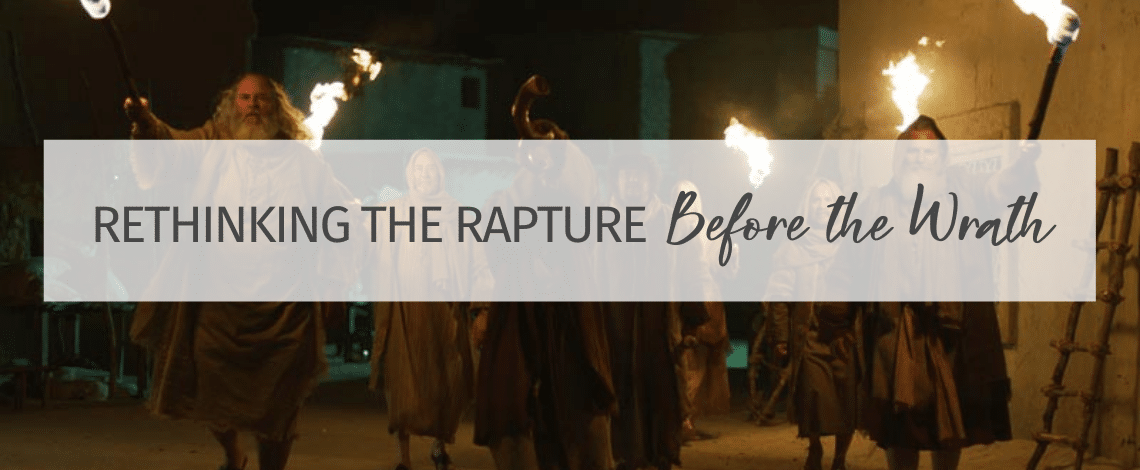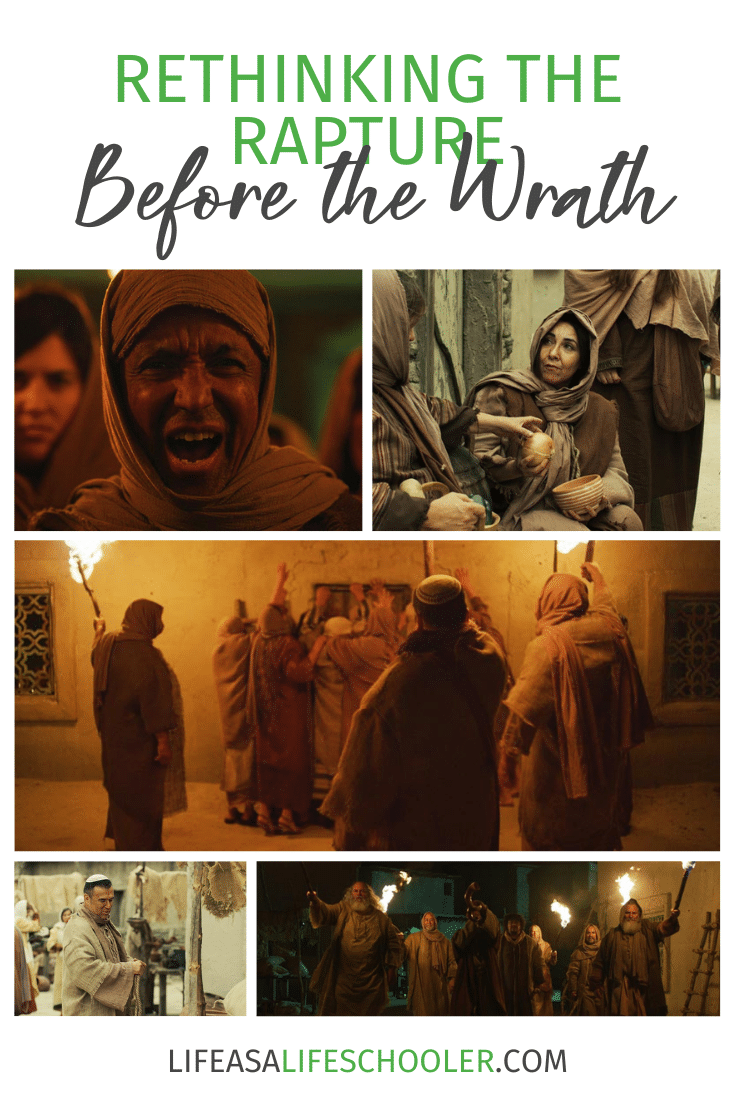Before the Wrath: A Documentary for Rethinking the Rapture
Throughout our homeschooling experience, Biblical truth has been has been the foundation and we have tried to focus on the Bible in everything we do, even entertainment. That doesn’t mean it’s always an explicitly “Bible movie,” but one of my favorite activities with my children is to watch a thought-provoking movie or documentary and talk about it afterward. It’s especially fun when we can watch something that puts a new twist on something we’ve taken for granted, or that delves deeper into an important topic.
Don’t miss your opportunity to WIN a $250 GIFT CARD from ChristianBook.com at the bottom of this post! Sponsored by Minno and Before the Wrath.
There are certain topics within Christianity that seem to divide more than others, and certainly eschatology is one of them! There is no majority viewpoint on the Rapture and in fact, as I learned from this film, 25% of professing Christians do not even believe in a literal Rapture at all! But, as one theologian said, “Jesus introduced the doctrine of the Rapture. If you don’t have that event, you don’t have the real Jesus.” That is why a film like Before the Wrath is so important, since the Jesus himself clearly taught about this topic.
And I believe the regardless of our perspectives on end times theology, we need to expose our children to multiple viewpoints so they can come to a solid logical conclusion based on their own interpretation and understanding. If you only expose them to one perspective on any topic, then naturally, if you have influence in their opinions, they will tend to adopt that same perspective. Teens, especially, need to figure out what they believe and why, not simply be told. Before the Wrath is a new documentary that will give them a good opportunity to explore the “Pre-Wrath” perspective of end times teaching.
Before the Wrath Background
Before the Wrath intrigued me when I first heard of it because our personal perspective on the Rapture is that Jesus will return “before the wrath.” It is a viewpoint that has gained (or re-gained) popularity in recent years. It made perfect sense to us after reading the book, The Pre-Wrath Rapture of the Church by Marvin Rosenthal, which gives a solid biblical case. The general explanation is that we will go through suffering and persecution (as most Christians have throughout church history), but that we will be delivered and taken to heaven right before God pours out his wrath in the final seal talked about in Revelation, which includes the bowl judgements.
The understanding is that God has not “appointed us to wrath,” but that we do sometimes suffer here as a consequence of sin, both ours and others’. When you begin to take a look at all the Scriptures and how they fit together, it seems to make a lot of sense. This film does not go too deeply into some of the supporting Scriptures for this particular viewpoint and in fact, does not even really try to push this perspective. It instead focuses on just one particular analogy Jesus used for the Rapture, the Galilean wedding, to simply get Christians to accept the idea of the Rapture.
Synopsis:
Before the Wrath takes you on a journey as the narrator and theologians describe a Galilean wedding in the time of Jesus, with actors playing out the story in between. The significance of the Galilean wedding is that this was the picture Jesus used with His disciples to describe His return. The bridegroom is Christ and we, the Church, are His bride! However, since we are in the 21st century, far removed from ancient times and certainly just as disconnected from Galilean culture, we don’t tend to understand the analogy in the way that Jesus intended it.
One of the issues that we as Christians constantly have to contend with is our tendency to read and interpret the Bible according to our own time and culture. Interestingly, I have also just started reading a book called Misreading the Bible Through Western Eyes by E. Randolph Richards and Brandon J. O’Brien that shows how common this is in our Christian culture and what a danger it can be. While this type of faulty interpretation is sometimes rather innocuous, it can often times be extremely harmful, so it’s important to recognize and correct it. In regard to the Gospels, it is important to understand that two-thirds of the Gospel took place in Galilee, so we need to “see the Messiah through the eyes of a Galilean.”
“This is the most profound discovery in human history.”
Those are the words from one theologian about the importance of some of the details (one in particular that I will not divulge here) that have been gleaned from a better understanding of the wedding analogy. And it is very interesting when you begin to break down some of the details and relate them to Jesus’ return.
- A Galilean wedding was the most important event in the town. It took place near the city gate and everyone would rush to witness it. Witnesses had to be present in order to ratify the covenant.
- The dowry was an insurance policy not for purchase of the bride, but to care for her.
- At the engagement, the big moment comes when the groom pours wine into a ceremonial cup which is presented to bride. Once he does this, she has choice as to whether or not she will accept or reject his marriage proposal. It is completely up to her as to whether or not the wedding takes place, as she is given all power.
But what set the events of the “wedding” in motion is one of the Biblical analogies that I found most beautiful and significant. Without giving away too many details, it has to do with our regular practice of communion (which means “common union”). This section of the documentary is so fascinating!
The main point of the movie, however, is to drill home the idea that while we can’t (and shouldn’t) predict an actual date, we can watch for specific signs and be ready for His return, just as a Galilean bride had to always be ready for her groom. In the same way, we must “occupy until He comes.” We may not know the exact date when the final leaf will fall from the last tree, but we know when we’re in the season of autumn by the vibrant colors overhead, the crisp smell of bonfires, and the distant honks of the geese migrating. Understanding Biblical prophecy is important in helping us keep a better watch for Christ’s return.
Intended Audience
As with anything, age will probably vary greatly depending on your child’s interest level and maturity, and I am always all for stretching our children’s abilities to learn information slightly above them, especially when it comes to Bible-related activities. But I would say that Before the Wrath would generally be relevant to ages 12 and up. My oldest son, 19, found it very interesting, but my youngest son, a very active almost 9-year-old, didn’t stay in the room long.
There is nothing at all that would be considered inappropriate, so it’s certainly safe for any age that is interested.
Lifeschooling Talking Points
In everything we do as lifeschoolers, we should try to see the educational value and maximize it. Obviously Bible and history come into play very easily in a documentary like this! Your children will learn some great lessons in how to see the Bible in its historical context as the theologians walk through the analogy step by step, and be sure to also check out the YouVersion Reading Plan. It would be great to do along with your kids to study the topic more deeply together!
From the historical context, it is fascinating to delve into the traditions and customs surrounding a Galilean wedding. Pay attention to the costumes and sets if your kids have an artistic eye. Of course, story always comes into play when you are watching a film, and the main story is the Bible, so you are studying perfect literature! But pay attention to how the story moves along and how the movie holds your attention, and help your children analyze the structure.
There are several charts and statistics given, as well, so there may be some potential for a quick little math lesson, and this is also an opportunity for critical thinking. Talking through this documentary provides an opportunity for narration and logical thinking, as you analyze the information in light of the Bible. For more narration opportunities, be sure to use the free Discussion Guide that goes along with the film.
Final Thoughts on Before the Wrath
What I really loved about this movie was that it was not simply a bunch of “talking heads” on the screen, expounding on theology. (Yawn). It’s not that the Bible is boring, of course, but a bunch of theologians sure can make it seem that way sometimes! And with all the dynamic and engaging ways one can tell a story on screen, there is no need to simply transfer information in a documentary like this when it can be given through story. I loved the way the director took the parable of the Galilean wedding and played it out on the screen in such a visually stunning way, while weaving in the factual data naturally. It was actually very moving to see the relationship of the groom with his tender looks toward his bride as analogy to Christ and His deep love for us.
Theologically speaking, I don’t know that there was anything hugely revelatory for me, personally, but I grew up with solid Bible teaching and as I said, we already share this perspective, so I imagine for many other Christians it would be eye-opening. To see it all laid out and dramatized, however, was certainly impactful! And there were facts and statistics that I was unaware of that helped me understand better where the church is in their thinking on the rapture.
Truly, the great “falling away” that the Bible talks about is happening, and it is a sobering thought. I can see now how important it is for pastors to turn their attention on this topic, especially during these times in which we are living. One interesting fact that was shared was that while 27% of the Bible is focused on prophecy, only 2% of the messages preached in churches are on passages related to prophecy! How will we know what to expect if we are not being taught?
I would definitely watch this documentary again (in fact, I did watch it a couple times)! It was a fresh way to look at the Second Coming and understand it better, and I encourage you to sit down and watch it with your kids, as well!
Family Discipleship is important and we want to be sure that you have help in teaching your family to seek Christ in all that they do! That doesn’t stop when it comes to entertainment.
Having Christ-Centered and Biblical sound options helps ensure that our hearts and minds are stayed on Christ, and not so easily consumed by the things of the world.
This Christ-Centered Family Entertainment Pack Giveaway has something for everyone! To enter for your chance to win, simply use the Rafflecopter form below.
Giveaway ends September 22nd, 2020, at 11:59 pm ET. Must be at least 18 years of age. Must be a resident of U.S. or Canada to enter. Selected winners will have 48 hours to respond to email notification to claim their prizes or another winner will be drawn. You are responsible for reading the Terms and Conditions on the Rafflecopter form before entering. and some thoughts on discipleship with movies
This post is in partnership with Before the Wrath movie and Minno (Click on the affiliate link for a FREE trail subscription). This giveaway is possible because of the generosity of our sponsors; Lifeschooling Conference, Minno, Before the Wrath movie, Heart and Soul Homeschooling, The Frugal Grandmom, They Call Me Blessed, Clarrisa R. West, Peace Creek on the Prairie, Beyond the Stick Figure, Sound Foundations Homeschool, Whole Child Homeschool, Homegrown Motherhood, and Fun With A Message.
- Top Books for Entrepreneurs - November 14, 2025
- Spiritual Warfare: The Power of Praise - November 13, 2025
- How to Make Instantpot Applesauce in 30 Minutes or Less! - September 30, 2025







12 Comments
Thank you for keeping us equipped with great resources to train our children!
I’m glad you find it helpful, Kari! 🙂
Love it! This would be great to supplement both of my boys’ homeschooling curriculum. Thank you for sharing!
It’s a great film! Hope you get a chance to see it!
Israel is the bride. We (Gentiles and Jewish Christians) are fellow heirs with Christ. Only Paul spoke of the rapture, not Jesus with fellow Jews.
There are many different views on the Rapture and that’s okay, as not everyone will agree on Scripture interpretation. However, Paul’s words are also just as much inspired Scripture as Jesus’ words. 🙂
To accept the “Pre-Wrath” Rapture, one must agree with Replacement Theology – a strange position for someone extolling a Jewish themed movie.
“The Jewish rejection of Jesus leads to the rejection of Israel and establishment of the church.” – Alan Hultberg ( A Case For the Pre-Wrath Rapture)
I don’t know who Alan Hultberg is, but I disagree with your assertion based on a book I read several years ago. Thanks for your comment, though!
This post seems to conflate belief in the rapture and belief in the return of Jesus. The idea of the rapture is a relatively new idea in Christian thought that originated about 150 year ago or so, and the belief is mainly found among US Christians. The return of Jesus, though, is something the church through the world has believed throughout church history. This post seems to talk about those that don’t believe in the rapture as if they don’t believe in the return of Jesus. I haven’t watched the movie discussed here, but based on the summary in the post of the movie’s use of a Galilean wedding, a Galilean wedding is a great analogy for the return of Jesus. I don’t see how the idea of a rapture fits in the analogy, though.
Scripture interprets itself. God’s children were not removed from Egypt during the plagues. The people WERE protected from God’s judgements but they were not removed from the land of Egypt while it was going on. This is a very important detail.
I was impressed with the movie, as the quality of production was much better than what we tend to see in Christian films and video. Some of the new discoveries about Galilean culture were quite interesting and helped me to understand some scriptural passages in a new way. My only issue: I really don’t like it when people talk about the Rapture without also talking about the Resurrection. Paul makes it quite clear that these are the same event, with one happening immediately after the other, both in an instant, when the Lord returns. I fear that when people just talk about the Rapture alone, they give the impression that it is only the faithful living that are taken up to be with the returning Christ, with the faithful departed being resurrected sometime later. That is not scriptural. They occur together,a nd should be talked about together. Other than that, the video was well done.
Thanks for your comment and insight!